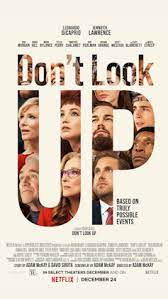“It is as if the world’s astronomers were telling us that an asteroid is heading our way and will make a direct hit destined to wipe out all of life, to which the public responds by remaining fascinated with sporting events, social media, the latest political machinations, and celebrity gossip.”
Reads like the script of the film Don’t Look Up
doesn’t it? The above quotation was written almost two years before the film
came out. In a highly recommended article in 2019 titled Facing Extinction1
Catherine Ingram addressed the probability of human extinction and possible
emotional, psychological, and spiritual responses to that scenario.
Ingram is not the only one who has warned us of such a
probability. Many others have done the same, and that is the theme of the film Don’t
Look Up.
The film, however, is not another attempt to warn us.
It is, unashamedly, a parody of our collective desire to look away (to not look
up.)
Certainly, the film is corny, absurd, and over-the-top
Hollywoodism and jingoism. As such, it is a film that this reviewer would
normally not wish to view. However, as has been said: the experience is not the
same thing as the message. The experience of watching this film may be cringe-worthy.
The message, however, is compelling. We simply are not taking sufficient (if
any) notice of the warnings that scientists, and others, have been trying to
tell us since at least the early 1970s.
The film is an analogy and the comet (that is destined
to destroy Earth) is a metaphor for a number of inter-connected, mutually
reinforcing events. Indeed, it is possible to think of comet as an acronym.
The comet metaphorically alludes to (inter alia): Climate
change, Overshoot, Mass
extinction, Environmental destruction,
Techno-addiction.
Many of our sacred cows of distraction are held up in
the film and shown for what they really are – dangerous addictions. Whether our
addiction be to mobile phones, or celebrity gossip, or the worship of the
hero/saviour, Don’t Look Up rails against them all.
This film then, is a warning to take the warnings
seriously.
Will it make a difference? Maybe, maybe not.
Does the film offer any hope? Maybe, maybe not. It
depends upon what sort of hope you are expecting. The final scenes mirror the
final words of Catherine Ingram’s paper with which this review was introduced:
“…it
is likely you have had many moments when you knew that love was all that ever
really mattered. And in your final breaths it is likely to be all that is left
of you, a cosmic story whispered only once.”1
1. Catherine Ingram, Facing Extinction, first
published February 2019, updated July 2021. https://www.catherineingram.com/facingextinction/
accessed 4 January 2022.

No comments:
Post a Comment
This blogsite is dedicated to positive dialoque and a respectful learning environment. Therefore, I retain the right to remove comments that are: profane, personal attacks, hateful, spam, offensive, irrelevant (off-topic) or detract in other ways from these principles.